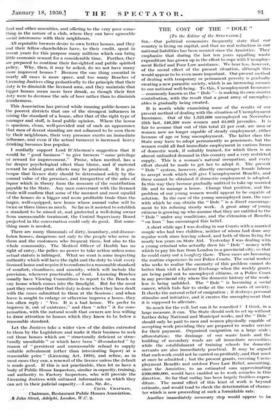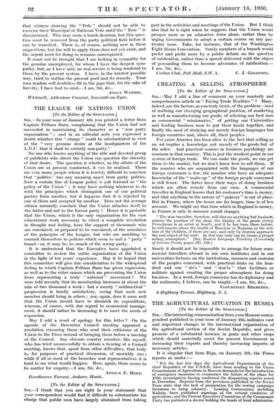THE COST OF THE " DOLE "
[To the Editor of the SPECTATOR.]
SIR,—Our political economists frequently state that our country is living on capital, and that no real reduction in our national liabilities has been secured since the Armistice. They emphasize that during the last ten years appalling waste expenditure has grown up in the effort to cope with Unemploy- ment Relief and Poor Law assistance. We hear less, however, of the moral effect of the present situation, although this would appear to be even more important. Our present method of dealing with temporary or permanent poverty is gradually creating a new parasitic society, which is an increasing menace to our national well-being. To this, Unemployment Insurance —commonly known as the " Dole "—is making its own sinister contribution, with the result that a great army of unemploy- ables is gradually being created.
It is worth while examining some of the results of our present method of dealing with the situation of Unemployment Insurance. Out of the 1,323,000 unemployed on November 25th last, 240,509 were women and 64,683 juveniles. It is fair to assume that out of this total 25 per cent. are men or women now no longer capable of steady employment, either because of age or long unemployment. The latter class the State may have to adopt permanently as pensioners, but the women could all find immediate employment in various forms of domestic work, if suitably trained, for which there is an almost unlimited demand in this country and a very restricted supply. This is a woman's natural occupation, and every effort should be made to get her to adopt it. The present " Dole " system, however, directly encourages female labour to accept work which will give Unemployment Benefits, and these cannot be obtained if domestic employment is adopted. In this way they become gradually unfitted to take up married life and to manage a home. Change that position, and the problem of our young women would appear to be capable of solution. In the case of the young unemployed man, the ease with which he can obtain the " Dole " is a direct encourage- ment to his refusing steady work. A great army of young citizens is growing up who assume that they are entitled to the " Dole " under any conditions, and the extension of Benefits " on loan " has encouraged this belief.
A short while ago I was dealing in our Courts with a married couple who had two children, neither of whom had done any regular work since leaving school, and both of them living for nearly ten years on State Aid. Yesterday I was dealing with a young criminal who actually drew his " Dole " money with which to pay his fare from London to a provincial city, so that he could carry out a burglary there. These cases are becoming the routine experience in our Police Courts. The social worker who seeks to realize the enormity of this problem cannot do better than visit a Labour Exchange when the weekly grants are being paid out to unemployed citizens, or a Police Court in any provincial city where the domestic history of the work- less is being unfolded. The " Dole " is becoming a social cancer, which bids fair to strike at the very roots of society. It checks the natural relief of emigration ; it destroys personal stimulus and initiative, and it creates the unemployment that it is supposed to alleviate.
So much for the evil, but can it be remedied ? I think, in a large measure, it can: The State should seek to set up without further delay National and Municipal works, and the " Dole " should only be paid to men and women physically capable of accepting work providing they are prepared to render service for their payment. Organized emigration on a large scale ; afforestation ; the drainage of our waste lands and the building of secondary roads are all immediate necessities, while the establishment of training schools for domestic servants are also immediately practical. It may be argued that such work could not be carried on profitably, and that must at once be admitted ; but the present grants, covering Unem- ployment Benefits and outdoor Poor Law Relief, amounting, since the Armistice, to an estimated sum approximating £500,000,000, would have enabled us to work miracles in this direction. So far that outlay has been largely fruitless expen- diture. The moral effect of this kind of work is beyond estimate, and would tend to check the deterioration of charac- ter which is now proceeding at such a formidable rate.
Another immediately necessary step would appear to be that citizens drawing the " Dole " should not be • able to exercise their Municipal or National Vote until the " Dole " is discontinued. This may seem a harsh decision, but this ques- tion must be removed from the party political field' before it can be remedied. There is, of course, nothing new in these suggestions, but the will to apply them does not yet exist, and the urgent need for doing so remains unrecognized.
It must not be thought that I am lacking in sympathy for the genuine unemployed, for whom I have the deepest sym- pathy, but, as I have said, no real service is being rendered to them by the present system. I have, in the briefest possible way, tried to outline the present peril and its remedy. Your own readers will doubtless fill in the gaps that, for the sake of brevity, I have had to omit.—I am, Sir, &c.,







































 Previous page
Previous page